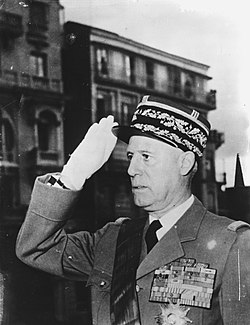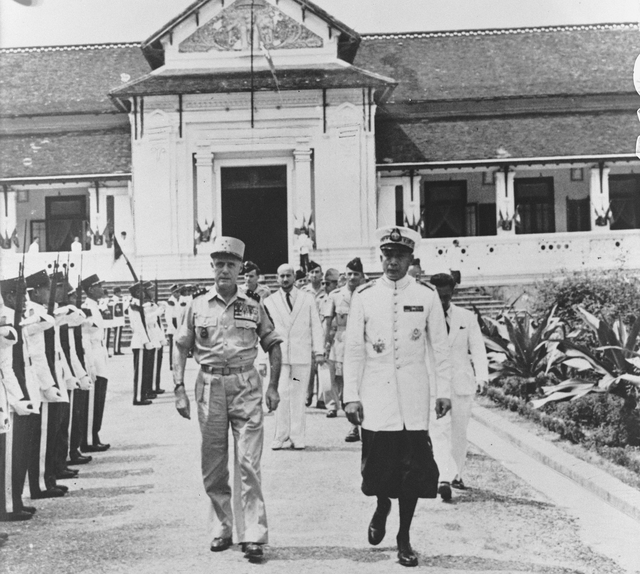Raoul Salan
French general, founder of OAS (1899–1984) From Wikipedia, the free encyclopedia
Raoul Albin Louis Salan (French pronunciation: [ʁaul salɑ̃]; 10 June 1899 – 3 July 1984) was a French Army general and the founder of the Organisation armée secrète, a clandestine terrorist organisation that sought to maintain French Algeria by preventing Algerian independence. He served as the fourth French commanding general during the First Indochina War. He was one of four retired generals who organized the 1961 Algiers putsch operation.[1] He was the most decorated soldier in the French Army at the end of his military career.[2]
Raoul Salan | |
|---|---|
 | |
| Birth name | Raoul Albin Louis Salan |
| Born | 10 June 1899 Roquecourbe, France |
| Died | 3 July 1984 (aged 85) Paris, France |
| Allegiance | France Vichy France Free France Organisation armée secrète |
| Service | French Army |
| Years of service | 1917–1959 |
| Rank | Général d'Armée |
| Commands | 6th Senegalese Tirailleur Regiment 14th Infantry Division French Far East Expeditionary Corps French forces in Algeria |
| Battles / wars | |
| Awards | Grand Cross of the Legion of Honor |
| Other work | Leader of the OAS |
| Signature |  |
World War I

Salan was born on 10 June 1899 in Roquecourbe, Tarn.[1] Enlisted in the French Army for the duration of the war on 2 August 1917, he was accepted in the École spéciale militaire de Saint-Cyr[1] on 21 August 1917, being assigned to the cadet student platoon of the 16th Infantry Regiment stationed at Montbrison, as part of the promotion "de Saint-Odile et de La Fayette" (1917-1918).[3][4] Salan graduated as an aspirant on 25 July 1918, and was assigned to the 5th Colonial Infantry Regiment (5e RIC) in Lyon on 14 August 1918.
As a platoon leader in the 5e RIC's 11e Compagnie, he took part in the fighting in the Verdun region (Saint-Mihiel, Les Éparges, Fort de Bois-Bourru, Côte de Oie, Cumières-le-Mort-Homme). He was mentioned in the Order of the Brigade by Order dated 29 December 1918.
World War II
Until France's surrender in World War II, Colonel Salan commanded a battalion of Senegalese troops. He initially sided with the Vichy Government, but defected to the Allies in December 1942, following the occupation of Vichy France in Case Anton.[5] Between the World Wars he was attached in various capacities to the Ministry of Colonies, and in 1941–43 he served with the Free French forces in French West Africa. After participating in the Allied invasion of France in 1944, he went to Indochina in 1945 and was commander in chief there during 1952–53.[6]
Indochina and Algeria
Summarize
Perspective
Salan served as the commander of French forces in Vietnam from 1945 to 1947.[7] By 1948, he was commander of all French land forces in East Asia, and after the death of Jean de Lattre de Tassigny in 1952, Salan became the commander-in-chief in Indochina.[7]

Salan served as commander-in-chief of French forces in French Algeria in 1956.[7] In 1958, he established special military internment centers for PAM rebels. The Minister of Interior declared a state of emergency, while the army engaged in a "struggle against the terrorism" of the FLN. Special powers were devolved to the military and were returned to civilian powers only in September 1959, when Charles de Gaulle made his speech on self-determination. General Salan refused to apply the Geneva Conventions ratified by France in 1951 because the detainees were not POWs. The civil authorities had different attitudes concerning the use of torture by the military.
In 1958, Salan called for the return to power of Charles De Gaulle, believing that the latter would protect French Algeria.[7] He retired shortly after, first moving to Spain, then to mainland France.[7] He was banned from entering Algeria in 1960.[7]
Nevertheless, Salan returned to Algeria to organize the putsch on 21 April 1961 with André Zeller, Edmond Jouhaud and Maurice Challe.[7] After the failure of the putsch, he became the chief of Organisation armée secrète (OAS), which attempted to disrupt the April 1962 Peace Evian Accords.[7] Salan, who was sentenced to death in absentia, was arrested in April 1962.[7] He was tried for treason and sentenced to life in prison.[8][9][10] Salan was pardoned and released from prison in June 1968.[1][11] He was amnestied by the French parliament and re-instated to the rank of general in 1982.
Death

Salan died on 3 July 1984. Every year, former members of the OAS bring flowers to his tomb on his death anniversary.[12]
Decorations
Summarize
Perspective
Salan was the most decorated soldier in the French Army.[7][13]

French and Colonial Decorations
- Legion of Honour
 Médaille militaire (12 July 1958)
Médaille militaire (12 July 1958) Croix de guerre 1914–1918 (1 citation)
Croix de guerre 1914–1918 (1 citation) Croix de Guerre 1939–1945 (8 citations)
Croix de Guerre 1939–1945 (8 citations) Croix de guerre des théâtres d'opérations extérieures (7 citations)
Croix de guerre des théâtres d'opérations extérieures (7 citations) Cross for Military Valour (1 citation)
Cross for Military Valour (1 citation) Volunteer Combatant's Cross 1914–1918
Volunteer Combatant's Cross 1914–1918 Combatant's Cross
Combatant's Cross Colonial Medal (Far East clasp)
Colonial Medal (Far East clasp) Grand Cross of the Order of the Black Star
Grand Cross of the Order of the Black Star
 (with GC rosette) Grand Cordon of the Order of the Dragon of Annam with Military and Civil title
(with GC rosette) Grand Cordon of the Order of the Dragon of Annam with Military and Civil title Officer and (later)
Officer and (later)  Grand Cross of the Royal Order of Cambodia
Grand Cross of the Royal Order of Cambodia Grand Cross of the Order of the Million Elephants and the White Parasol
Grand Cross of the Order of the Million Elephants and the White Parasol Grand Cross of the Tai Order of Civil Merit (Sip Song Chau Tai)
Grand Cross of the Tai Order of Civil Merit (Sip Song Chau Tai) Grand Cross of the Order of Glory
Grand Cross of the Order of Glory Grand Cordon of the Order of Ouissam Alaouite
Grand Cordon of the Order of Ouissam Alaouite Grand Cross of the Order of the Star of Anjouan
Grand Cross of the Order of the Star of Anjouan- Grand Cross of the Étoile des Comores
 Royal Order of Monisaraphon
Royal Order of Monisaraphon Gallantry Cross, with palm
Gallantry Cross, with palm National Defense Medal (Cambodia)
National Defense Medal (Cambodia) Syria-Cilicia commemorative medal
Syria-Cilicia commemorative medal Order of Civil Merit of the Syrian Arab Republic
Order of Civil Merit of the Syrian Arab Republic 1914–1918 Inter-Allied Victory medal
1914–1918 Inter-Allied Victory medal 1914–1918 Commemorative war medal
1914–1918 Commemorative war medal 1939–1945 Commemorative war medal with "Africa", "Italy", "France", and "Germany" clasps
1939–1945 Commemorative war medal with "Africa", "Italy", "France", and "Germany" clasps Aeronautical Medal
Aeronautical Medal Medal for the War Wounded
Medal for the War Wounded- Annam Order of Military Merit
- Order of the Reign of King Savang Vatthana
 1943–1944 Italian campaign medal
1943–1944 Italian campaign medal Indochina Campaign Commemorative Medal
Indochina Campaign Commemorative Medal North Africa Security and Order Operations Commemorative Medal with "Algeria" clasp
North Africa Security and Order Operations Commemorative Medal with "Algeria" clasp
Foreign Decorations
 Distinguished Service Cross (US)
Distinguished Service Cross (US) Commander of the Order of the British Empire (CBE) (UK)
Commander of the Order of the British Empire (CBE) (UK)- Vietnam Campaign Medal (Thailand)
 Sena Jayaseddh Medal (Cambodia)
Sena Jayaseddh Medal (Cambodia)
Bibliography
- Mémoires Fin d’un empire (4 volumes), Editions Presses de la Cité, 1970–74
- Le sens d’un engagement, 1970
- Le Viêt-minh mon adversaire, 1971
- Algérie française, 1972
- L’Algérie, de Gaulle et moi, 1974
References
Further reading
External links
Wikiwand - on
Seamless Wikipedia browsing. On steroids.
